Delicious and FluidDB¶
Preamble¶
This article discusses the relationship between the social bookmarking site, del.icio.us, and the new online database FluidDB. It also talka about a utility that can be used to transfer bookmarks from del.icio.us to FluidDB, and a little about what else you can do with FluidDB.
This article is an HTML version of the PDF posted previously posted here.
Some examples in this article use the command line version of fdb.py. This is a client library for FluidDB, available from GitHub at http://github.com/njr0/fdb.py
The delicious importer described here is also distributed with fdb.py.
Delicious and FluidDB¶
A simple mental model of a bookmark in del.icio.us (http://del.icio.us) [1] looks something like this:
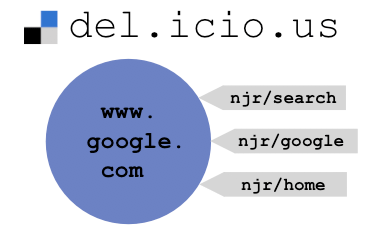
This represents the site www.google.com, and I have tagged it with my search, google and home tags.
Perhaps the simplest way to map this to FluidDB is as follows. This is what delicous2fluiddb.py currently does.
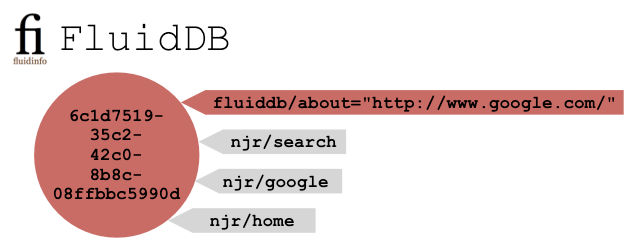
Everything looks very similar except that the address (ID) of the object we store the information on is more prominent and the subject of the bookmark (the URL) is placed on the special about tag. This address (id) is real (it exists in FluidDB and is permanent).
$ fdb show -a "http://www.google.com/" /id
Object with about="http://www.google.com/":
/id = "114a1ae8-7bed-41f8-b2f9-1bcad2db02c2"
Unlike the other tags, the about tag is not owned by njr, but is system-wide. So we often abbreviate it to just about.
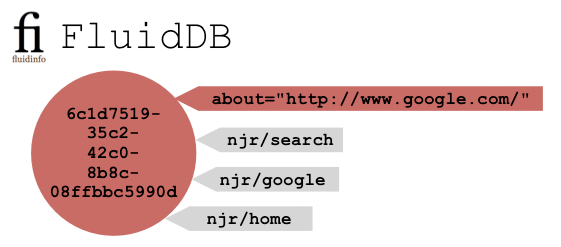
The about tag is special in that (a) its value can never be changed and (b) it is unique. [2] This one is permanently associated with the object having the ID 114a1ae8-7bed-41f8-b2f9-1bcad2db02c2. So by attaching these tags to this object, we can be entirely confident that they will always be associated with the URL http://www.google.com/.
Del.icio.us actually allows us to store a little more information in a bookmark—a title, some notes and an update date. We can also think of the URL as a tag itself, but as in FluidDB, it’s owned by the system, not by njr. So a more complete picture of a del.icio.us bookmark might be:
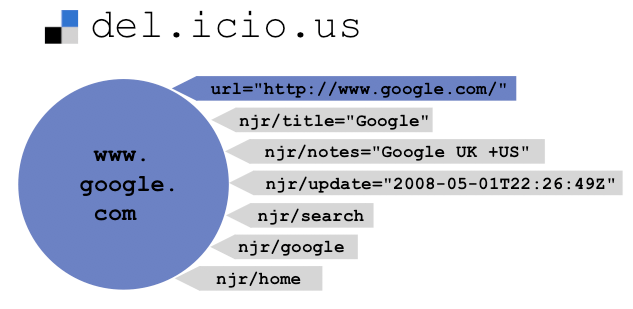
Note that in del.icio.us, the tags are just names, but the other four items of information on the bookmark have values.
Replicating this in FluidDB is trivial, because all tags can take values, which can have various types—strings, numbers, dates and much more.
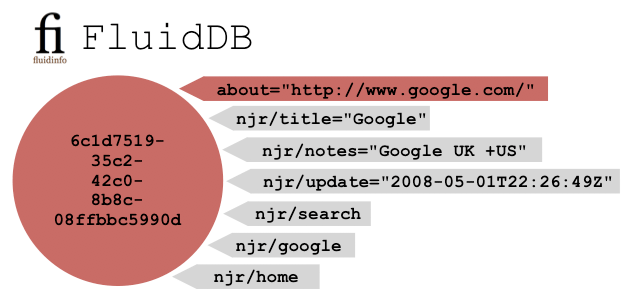
Although delicious2fluiddb.py doesn’t do this yet, it would be trivial for it replicate the delicious title, notes and update fields, to produce the structure shown above; soon, it will.
There are many other ways we could represent information from del.icio.us in FluidDB. Since the value of a tag in FluidDB can be a set, another obvious way to represent the tags would be as a set of strings on a tag called tags (or perhaps delicious-tags).
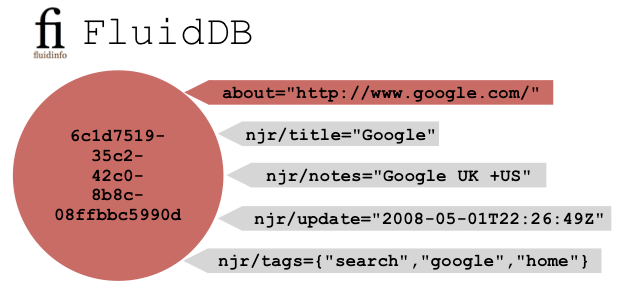
Of course, once in FluidDB, we can also add as many other tags as we like to the object, and these tags may or may not have values.
Privacy, Sharing, and Permissions¶
But before we get onto that, there’s one more crucial bit of information that del.icio.us stores about a bookmark—whether it is shared (meaning anyone can see that njr has the bookmark, and what tags I’ve put in it), or private (meaning that only I can see it).
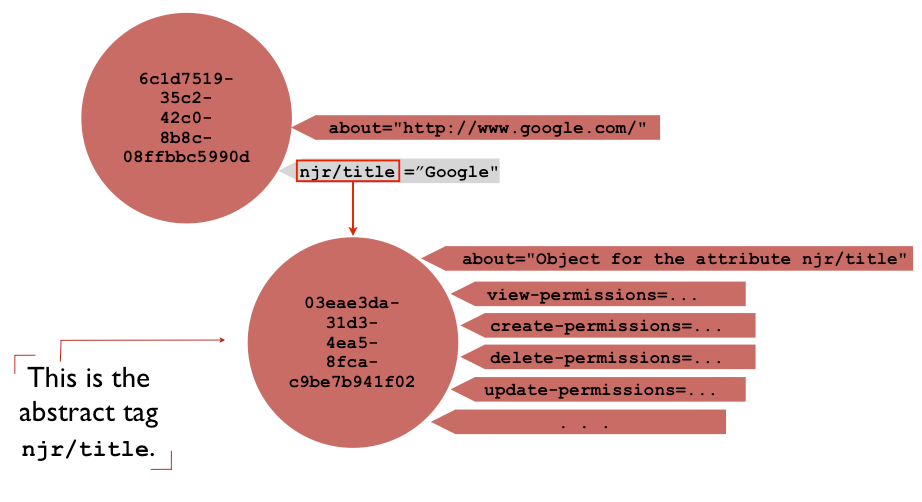
Right now, delicious2fluiddb.py only uploads the shared bookmarks to FluidDB. But how would it make information shared or private?
As well as allowing the arbitrary tagging of objects, and providing a query language, FluidDB also possesses a rich permissions structure. In fact, there are fine-grained permissions associated with every different tag name in the system (njr/google, njr/title, terry/rating etc.) [3]
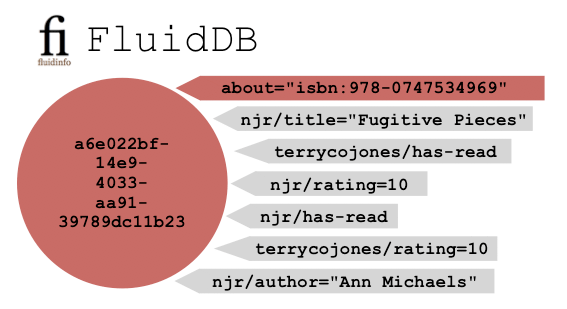
To illustrate this, we can use fdb to query FluidDB and check this.
$ fdb show -a "Object for the attribute njr/title" /id
Object with about="Object for the attribute njr/title":
/id = "b341c470-70bf-49bb-9e23-806bb2674fa5"
This command asks fdb to show the axetag /id (which is fdb shorthand for the object’s ID), for the about whose about tag is the string “Object for the attribute njr/title”. The -a means that we wish to specify the object by it’s about tag rather than, for example, by ID or by a more general FluidDB query. If you have fdb and a username and password, you should be able to run this query and get exactly this result.
While this isn’t the place to go into all the detail, the key thing is that while all objects in FluidDB are shared, all data in FluidDB is subject to a strong, fine-grained permissions system.
A user can control various kinds of read and write access for each of their tags, with separate permissions for tags having each name (njr/title, njr/google etc.)
Beyond Simple (Valueless) Tags¶
Of course, the whole point of FluidDB, is not to imitate del.icio.us, but to enable more powerful things. Some of the power comes when different people tag the same object, which doesn’t have to be about a URL.

This object is guaranteed to be about isbn:978-0747534969, since the about tag can never change. So if we query FluidDB looking for books that both njr and terry have rated 10, we will find this and can retrieve any information on the object, subject to the permissions on the tags.
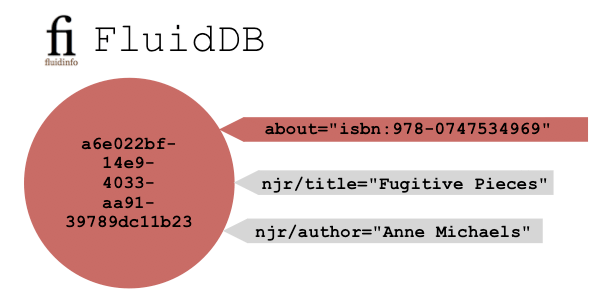
The FluidDB query terry/rating=10 and njr/rating=10 would allow this object to be retrieved, and its title could be found with the FDB command:
$ fdb show -q "terry/rating=10 and njr/rating=10" /njr/title
This won’t actually work right now (because there is no user terry at the time of writing, still less one who has read Fugitive Pieces and rated it 10), but this shows the idea.
(For more details of the FluidDB query language, see http://doc.fluidinfo.com/fluidDB/queries.html.)
Notes¶
| [1] | del.icio.us, now often delicious.com, is the original social bookmarking site. It is now owned by Yahoo. |
| [2] | There can, however, be many objects with no about tag; and there are. |
| [3] | Each tag name used in FluidDB actually has a corresponding object in the system; we sometimes call this the “abstract tag”, to distinguish it from real tags attached to objects in the system. The permissions system operates on these abstract tags, and permissions set on an abstract tag apply to all the tags used with that name. |